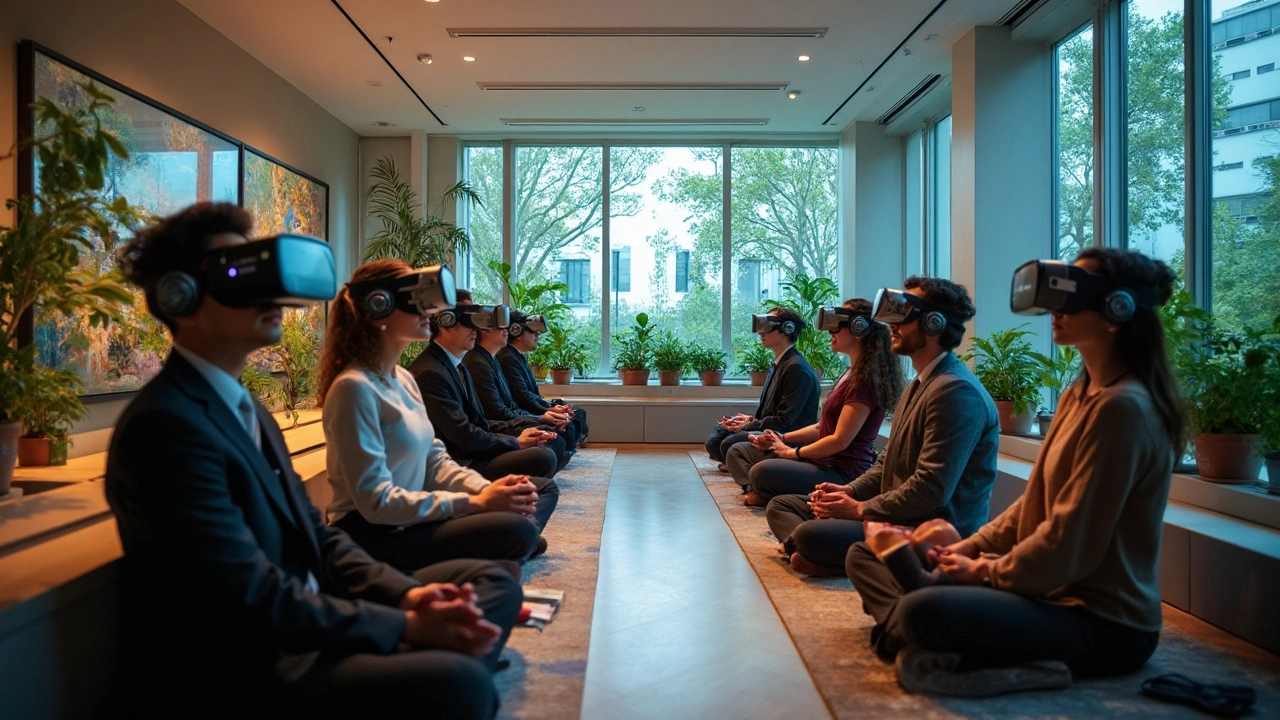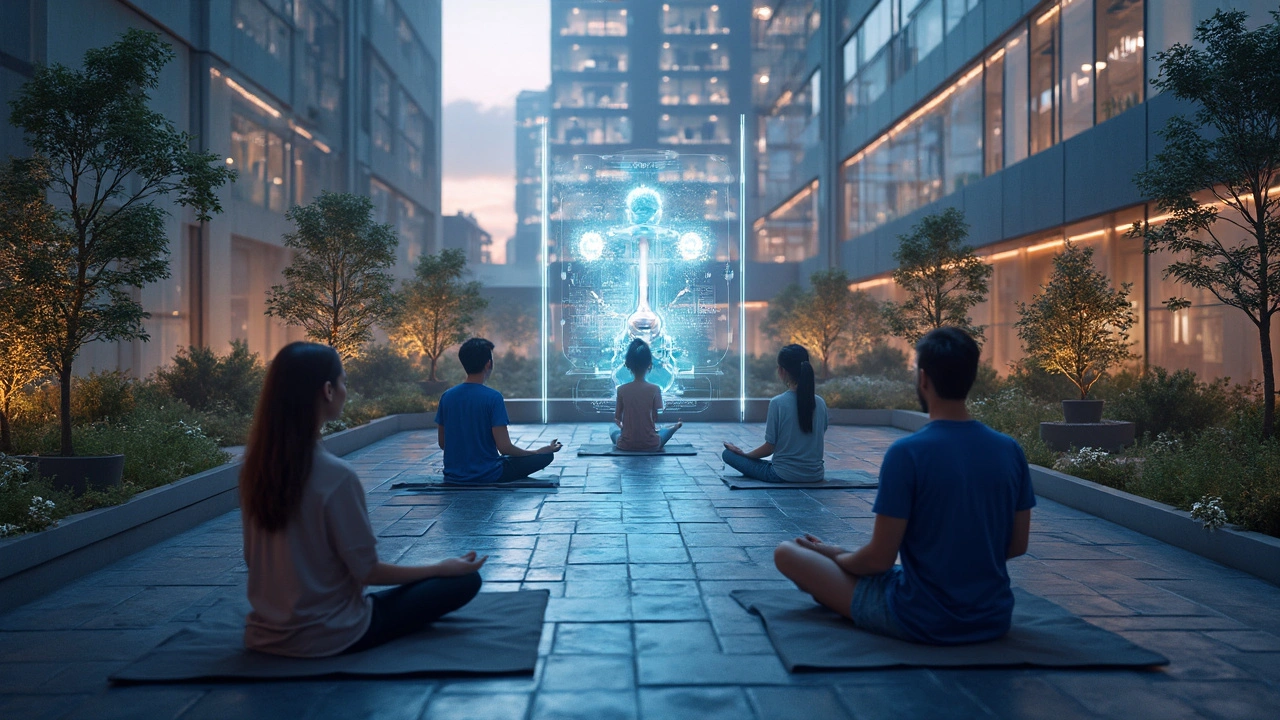
Mindfulness is no longer just about sitting in silence for hours. It's quickly adapting to our fast-paced world and these changes are coming faster than you might think. We're seeing tech like VR bringing meditation sessions into your living room, making you feel like you’re lounging on a sunny beach or sitting in a peaceful forest.
And there's more—AI is stepping in to personalize mindfulness. Imagine an app that could track your stress levels and suggest a quick breathing exercise just when you need it. This is not science fiction anymore. It's happening. These personalized programs could make mindfulness more reachable for everyone, especially those who feel they don't have the time to practice.
- Tech and Mindfulness
- Personalized Mindfulness Programs
- Mindfulness in the Workplace
- Future Innovations
Tech and Mindfulness
Welcome to the future where mindfulness meets technology. It's an exciting time because we're seeing some groundbreaking changes that are making mindfulness more accessible to everyone, no matter where they are.
Virtual Reality Experiences
Have you ever wanted to meditate on a serene beach but couldn't afford the trip? No problem. With virtual reality (VR), you just pop on a headset and voila—you're there. VR has become a phenomenal tool in making meditation immersive and enjoyable. The visual and auditory stimuli help enhance the experience, making it easier for many to focus and truly relax.
AI-Powered Personalization
Artificial Intelligence is not just for robots. It's playing a big role in tailoring mindfulness practices to fit individual needs. AI algorithms can track your stress levels and suggest specific exercises at opportune times. For instance, if a wearable device detects your heart rate going up, you might get a prompt on your phone recommending a quick meditation session.
Wearable Technology
Another tech advancement making waves in wellness is wearable tech. Devices like smartwatches are equipped with apps that monitor your stress, breathing patterns, and even sleep cycles. They provide real-time feedback to help manage stress levels effectively. This constant connectivity means that mindfulness can be a continuous part of your day.
Online Communities and Apps
The rise of apps like Headspace and Calm has driven the popularity of meditation. These platforms offer guided sessions for beginners and seasoned meditators alike, with different types of meditations to suit every lifestyle. Online communities have also formed around these apps, offering support and motivation for those on their mindfulness journey.
Mindfulness and tech are walking hand in hand into the future, and the possibilities are endless. Whether it's through innovative apps, wearable gadgets, or virtual meditation retreats, technology is helping to shift mindfulness into a realm where everyone can find some Zen in their own way.
Personalized Mindfulness Programs
Have you ever felt like mindfulness techniques don't quite fit your lifestyle or needs? Well, here's the game-changer: personalized mindfulness programs. These are not just one-size-fits-all; they're tailor-made to suit your unique preferences, schedules, and goals.
With the rise of apps that learn from your behavior, you can now have a mindfulness program that's as flexible as your schedule. Some apps analyze your stress levels and mood patterns, providing you with guided meditations or breathing exercises at just the right moment. Imagine waking up to a gentle reminder for a morning meditation specifically designed to boost your day's productivity.
How Technology Fits In
Technology plays a huge role in customization. AI algorithms can make suggestions that are spot on. Let's say your app notices you're more stressed during weekdays than weekends. It'll tailor your mindfulness exercises accordingly, perhaps with more stress-relief options during those busy workdays.
Some platforms are even using data to match you with mindfulness practices that align with your daily activities. Maybe yoga-based mindfulness in the morning, breathing exercises before a big meeting, and gratitude practice before bed. It’s mindfulness on your terms!
Incorporating Feedback
User feedback is critical in this trend. Companies are constantly tweaking their services based on what you find useful or not. It’s a continuous cycle of improvement that benefits us all.
Benefits and Challenges
One of the visible benefits is that more people are finding it easier to stick with a mindfulness routine. However, it's crucial to note that integrating technology also brings challenges, like ensuring data privacy. Always check your app's privacy policy to understand how your data is handled.
Ultimately, personalized mindfulness programs are reshaping how we practice, making it more relatable and sustainable for everyone.

Mindfulness in the Workplace
So, let’s talk about something super relevant: how mindfulness is taking over the workplace. Businesses are realizing that a mindful employee is a happy employee, and a happy employee means great results. No brainer, right? It’s like the wellness wave hit the corporate world, and it's here to stay.
The Rise of Mindfulness Programs
More companies are introducing formal mindfulness programs and it's not just for the big fish like Google or Intel. Small businesses are getting in on the action too. Offering weekly meditation sessions or even short daily mindfulness breaks can make a world of difference. Employees report feeling less stressed and more focused, which is exactly what you want when managing deadlines and big projects.
Benefits for Employers and Employees
Why should employers care? Well, research has shown that mindfulness can boost productivity by lowering stress and improving concentration. It also reduces employee turnover and lowers healthcare costs by helping people manage their stress levels better. Employees, on the other hand, get a lot out of this too. They feel valued and more connected to their work, which can improve team dynamics and job satisfaction.
Looking to implement something similar where you work? Start small. Maybe dedicate the first five minutes of morning meetings for a quick breathing exercise. Gradually build this habit, and who knows, it might even turn into a company-wide practice!
Statistics Speak Volumes
Want some numbers? A recent survey found that workplaces practicing mindfulness see a 21% reduction in burnout cases and a 14% improvement in employee engagement. And for the data lovers out there, here’s a quick snapshot:
| Benefit | Improvement |
|---|---|
| Productivity | 10% |
| Stress Levels | -25% |
Pretty convincing, right? Giving mindfulness a shot might just be what your workplace needs to leap into the future.
Future Innovations
When it comes to mindfulness, the future is looking pretty tech-savvy. Imagine popping on a sleek VR headset and stepping into a world where you can attend a live meditation class from anywhere in the globe. It sounds futuristic, but it’s closer than you think. Tech companies are investing big bucks into creating immersive experiences that take traditional practices to another level.
Moreover, AI is set to revolutionize how we practice meditation. We're talking smart apps that learn your habits, analyze your stress patterns, and offer tailor-made mind-calming sessions. We're moving towards an era where these digital assistants become your personal mindfulness coaches.
Augmented Reality (AR) Experiences
AR has the potential to blend the digital and real worlds in a way that could enhance wellness practices. Picture yourself in a bustling office, but with AR glasses, you can transform your space into a peaceful garden for a quick mindfulness break. This technology can make mindfulness more integrated into daily life, even in the most hectic environments.
Biofeedback Devices
Then there are biofeedback devices that monitor physiological signals like heart rate and skin conductance to give real-time feedback on your mental state. This feedback can help people adapt their habits in the moment, offering a more effective approach to reducing stress through mindfulness.
In the future, we might even have smart home devices equipped with mindfulness features. Imagine a home that automatically dims the lights and plays soft music when your stress levels rise. It's about making mindfulness a seamless part of our lives, using technology to keep us centered in an ever-chaotic world.





